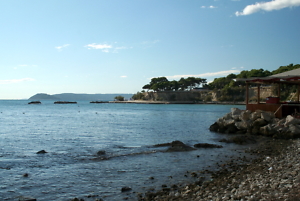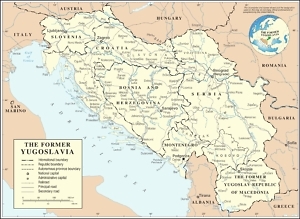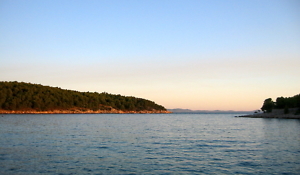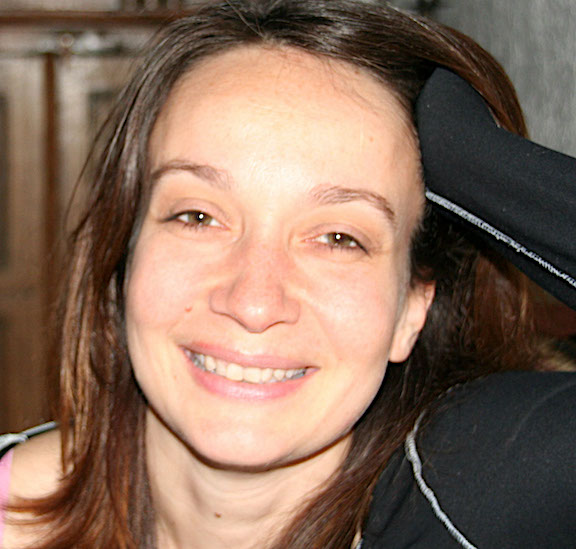What the F?
A civil war, a brush with death, and a really good tan
The first time someone pulled a gun on me, I was 22 and had the best tan of my life. (I used to the say “the only time,” but given the state of affairs in America, I’m keeping my options open.)

I was visiting my grandfather in Split, an ancient city on the Adriatic coast that began as the retirement home of a Roman emperor but nearly 2,000 years later was part of the region of Croatia, in the country soon to be known as the “former Yugoslavia,” which that summer of 1993 was in the bloody throes of civil war.
My father is from Split, while I, like my mother, was born in Serbia, which was fighting Croatia at the time of my visit. It’s important to note that Serbs and Croats speak the same language but have different accents, and I absorbed my parents’ equally growing up in the U.S. (Think Brooklyn and Liverpool in the same sentence.) Yugoslavians found the mashup — and the fact that I couldn’t tell the accents apart — adorable when I was a kid. Less so after the Balkan War broke out.
So, when I got to Croatia, my grandfather told me to pretend I was a tourist who spoke only English, lest the Serb in me get the crap beaten out of her, or worse. “But how can anyone even tell the difference?” I whined. He stared at me over his glasses and quietly repeated: “Tourist.”
Split was the unofficial headquarters of international reporters and relief organizations, which made the city relatively safe. For Serbia, attacking it would’ve meant attacking the world. Fifty miles away, people were getting slaughtered, but in Split it was surreal how far away the fighting seemed — so surreal that I brushed off my grandfather’s orders. What did a man who fought fascists, Nazis, and survived three concentration camps know? Every day I went to the beach and spent my nights in bustling cafes or dancing in clubs with my cousin and his best friend, on whom I had an unrequited crush.
 Then one evening I ended up alone on the beach. It was the golden hour, when the heat finally let up and elderly locals usually took their daily dip — but not that day, for some reason. It did occur to me it might be dangerous to be there by myself, in wartime, but in my finite wisdom I swatted that thought away like a pesky bug.
Then one evening I ended up alone on the beach. It was the golden hour, when the heat finally let up and elderly locals usually took their daily dip — but not that day, for some reason. It did occur to me it might be dangerous to be there by myself, in wartime, but in my finite wisdom I swatted that thought away like a pesky bug.
I was a couple hundred yards out in the water when I noticed a soldier on the beach stripping down to his underwear. I kept swimming. Within minutes he was beside me: “You’re new. Parents just start lettin’ you out on your own?” He winked.
In my early 20s, I looked barely pubescent. This guy was at least 30. I turned right back toward the deserted beach, though not before telling him, in the Serbo-Croatian I’d been duly warned not to speak, that I didn’t live in Split. He followed.
Back on shore, I began drying off so hard I gave myself rug burns. He moved in close. A-foot-and-a-half-away close.
Where did I live? he wanted to know.
“Seattle.”
“Damn girl, that’s far. Is your family from here?”
“Yep.”
“You go to high school there?”
“Nope, just finished college.”
“Damn girl, I thought I had a 14-year-old on my hands!”
“I know.”
Unfazed, he winked again. “So what do you do for fun in Seattle?”
I started rambling — about acting classes, rain, grunge, this sterile new coffee chain taking over the city. At that, his face hardened into something I can only describe as poison. Had I found Starbucks’ lone Balkan shareholder?

He bent down slowly. Lying under his folded fatigues was a holster. There was no more winking as he calmly removed the gun and even more languidly waved it at my nose. And asked how come I knew such ugly Serbian words.
I almost laughed at the silliness of the question. What on Earth was he talking about? Then I thought, etiquette likely dictates that the pointee of a gun not laugh at the pointer.
I smiled a frozen smile … for an eternity-long minute. Until it hit me: Third grade!
I moved to America when I was 4 and, like a lot of immigrant kids, I refused to speak my native tongue in my new country. I’d respond in English even when my parents tried bribing me to speak Serbo-Croatian. But I — and my laziness — could not be bought for a mere ice cream cone a day. However, by third grade we were living near D.C. and the Yugoslavian embassy, where I spent every other Saturday learning the language, the Cyrillic alphabet, the epic battles of WWI, WWII …
As casually as possible, I explained my supplementary education to the soldier, blaming crazy Serbian teachers — I spit on the ground for emphasis — for the way I spoke. Adding that my Croatian parents and I, sadly, never spoke Croatian when I was growing up in our 100% Croatian home.
He stood there ruminating, still spinning his gun. I was shaking too hard to dress myself, so I tried nonchalantly to gather my things and sidle off toward the road.
“Hey!” I froze when I heard his voice. I turned around slowly, thinking, This is how I die. Damp and barefoot and with one hell of a tan.
The brain is a funny thing. Well, my brain is. Hilarious, really. In my fear, my neurons forgot the commands for putting on flip-flops, but they could formulate the thought: I hope the newspaper will mention the lovely golden hue of my cadaver.
His gun pointed at me, the soldier smiled a nasty smile. “If you ever want some ethnic cleansing of your tongue, you know where to find me.”
And he winked.
We were back! I almost hugged him for being just a good old pedophile again. Almost. Instead, I smiled airily, flashed a QEII wave, and scurried off.
I have no memory of the walk home, a half-mile past cars and people who must have wondered why this bikini-clad young woman was carrying her clothes and flip-flops.
When I flew into the house, I locked the door behind me, four times. My grandfather looked up over his newspaper, and I gave him the play-by-play. He sighed, folded the paper, and took off his glasses. A gesture reserved for the particularly intellectually challenged.
“Coffee,” he said calmly.
“Pardon?”
“Kava is Croatian for coffee. You say kafa, which is Serbian. That’s what set him off.”
My shaking turned to convulsions.
“You mean. I. Could. Have. Died. Over an f?”
“Yes.”
“The letter f.”
“Yes.”
It’s been more than 20 years since that summer. The horrors of the Balkan War have subsided, becoming a living history for those who experienced it and a textbook history for those who did not. And once again, the way I talk sparks laughter and smiles in my homelands.
But in my other homeland, America, I still get that question. One I’ve been asked for decades now: “If you can’t even tell them apart, what were Croats, Serbs, and Bosnians fighting about?”
At first it confused me, then it frustrated me. Now, I struggle to hold back a quiet rage. Because that question, it is its own answer.
If you need to ask, then I ask you: Color, creed, accent — what makes for an acceptable justification for war?

Copyright ©2020 by Natasha Senjanovic. All rights reserved. An award-winning journalist and former public radio host, Natasha Senjanovic was born in the country formerly known as Yugoslavia, grew up in the U.S., and spent most of her adult life in Italy. She is creator of the project Women Like Sex. She lives in Nashville … for now.


